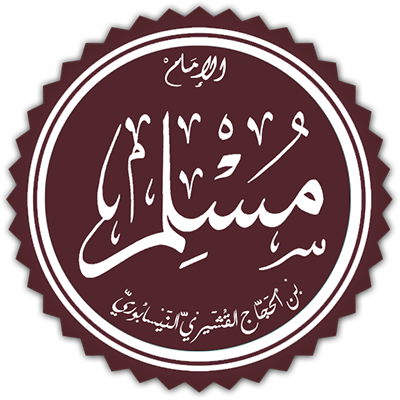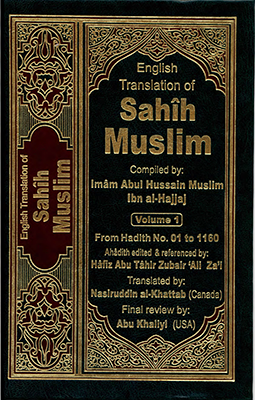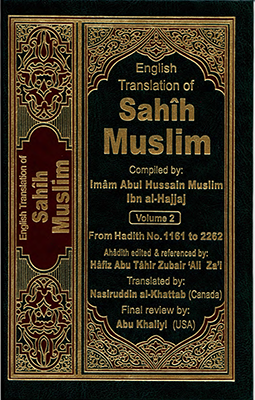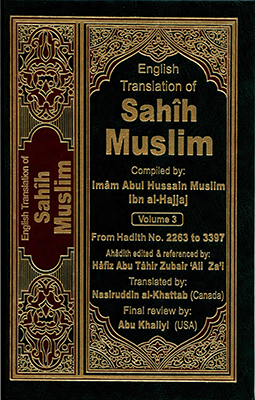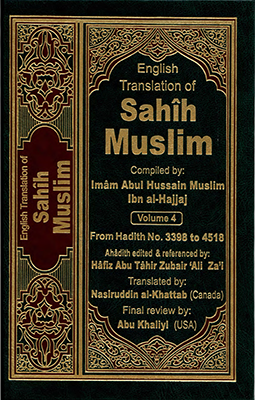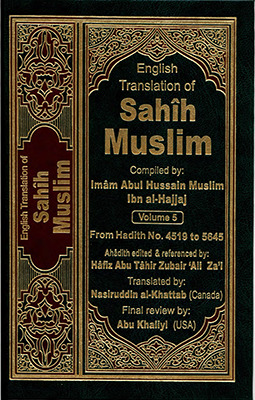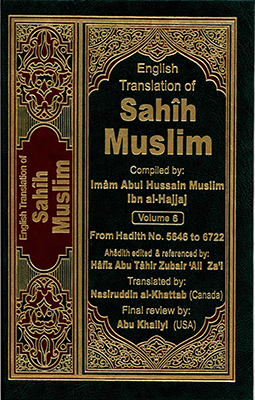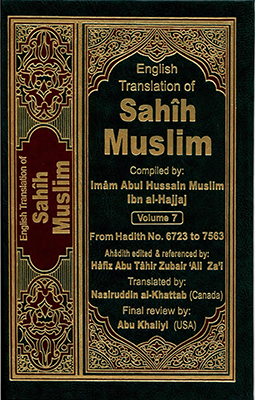Al-Imam, al-Hafidh, al-Hujjah 'Abul-Hussayn Muslim bin al-Hajjaj bin Ward bin Koshah al-Qushayri an-Nishapuri was born in 202 or 204 or 206 AH in Nishapur and educated in the same town.
His parents were religiously minded people and as such he was brought up in a pious atmosphere. This left such an indelible impression on his mind that he spent the whole of his life as a God-fearing person and always adhered to the path of Righteousness. His excellent moral character can be well judged from the simple fact that he never indulged in backbiting, a very common human failing.
Seeking Knowledge
He heard Ahadith the first time, at age eighteen, from Yahya bin Yahya Tamimi. In 220 AH he went on pilgrimage to Makkah where he heard Ahadith from 'Abdullah bin Salamah Qa'nabi, the most revered pupil of Imam Malik and the principal teacher of Imam Muslim. In Kufa, he heard Ahadith from Ahmad bin Yusuf and a host of other teachers. In addition, he also heard from nearly 220 teachers in Makkah, al-Madinah, 'Iraq and Egypt. The system of hearing Ahadith in those times consisted in hearing and writing down Ahadith along with their chains of narration.
His Teachers
Among the renowned teachers of Muslim were al-Imam Ahmad bin Hanbal, Ahmad bin Mundhir Qazzaz, Ishaq bin Rahwiyah, Ibrahim bin Sa'eed Jawhari, Ibrahim bin Musa, Abu Ishaq Razi, Ahmad bin Ibrahim, Ishaq bin Musa Ansari (Abu Masa) Isma'il bin Abu Uwais, Harmala bin Yahya (Abu Hafs TajIbI) Hasan bin Rabi' Burani, Abu Bakr bin Abu Shaiba, Ya'qub bin Ibrahim Dawraqi, Abu Zur'ah Razi, Yahya bin Ma'een and other Huffadh.
His Relationship with Imam Bukhari
Having finished his studies, he settled down at Nishapur. There he came into contact with Imam Bukhari, and was so much impressed by his vast knowledge of Hadith and his deep insight into it that he kept himself attached to him up to the end of his life. He was an ardent admirer of another great-teacher of Hadith, Muhammad ibn Yahya adh-Dhuhli and attended his lectures regularly, but when the difference of opinion between Muhammad bin Yahya and Imam Bukhari, on the issue of the creation of the Holy Qur'an, sharpened into hostility, Imam Muslim sided with Imam Bukhari and abandoned Muhammad bin Yahya altogether. He was thus a true disciple of Imam Bukhari.
His Sahih
He wrote many books and treatises on Hadith, but the most important of his works is the collection (Jami’) of his Sahih Some of the commentators of Ahadith are of the opinion that in certain respects it is the best and most authentic work on the subject. Imam Muslim took great pains in collecting 300,000 Traditions, and then after a thorough examination of them retained only 4000, the genuineness of which is fully established.
He prefixed to his compilation a very illuminating introduction, in which he specified some of the principles which he had followed in the choice of his material.
His Students
Imam Muslim had a very wide circle of students, who learnt Hadith from him. Some of them occupy a very prominent position in Islamic history, e.g. Abu Hatim ar-Razi, Musa ibn Harun, Ahmad bin Salama, Abu 'Isa Tirmidhi, Abu Bakr ibn Khuzaymah and Abu ‘Awana.
His Death
The circumstances of his death, as recorded in Tarikh Baghdad and Sira A'lam an-Nubala', are very strange indeed, and show his excessive passion for the science of Hadith and his inordinate zeal for inquiry and research in this field. According to Ahmad bin Salamah, a gathering was held to benefit by the knowledge of Imam Muslim. There he heard a Hadith which he had not heard before. When he came back home, he lit a lamp and told his family not to allow anyone to enter his room. His family told him about a gift they had received, a basketful of dates. He told them to bring it to him. Immersed in his search for that particular Hadith, he kept on eating the dates, one by one, while he was absorbed in his search for the Hadith. By early morning, he found the Hadith but the basket was empty. It was for this reason, it is said, that he fell sick and died.
Written Works
The following are the important works of Imam Muslim as mentioned by Hakim and other Hadith scholars:
1. Al-Asami wal-Kuna
2. Kitab at-Tabaqat
3. Kitab al-Wahdan
4. Kitab al-Afrad
5. Kitab al-Aqran
6. Kitab Awlad as-Sahabah
7. Kitab Afrad ash-Shamiyyin
8. Kitab Mashaikh Malik
9. Kitab Mashaikh ath-Thawri
10. Kitab Masha'ikh Shu'bah
11. Kitab Man Laisa Lahu al-Irawin-Wahid
12. Kitab al-Mukhadoramin
13. Kitab Tabaqat at-Taba'In
14. Kitab al-Musnad al-Kabir 'ala ar-Rijal
15. Kitab al-Jami' 'alal-Abwab
16. Kitab al-Musnad as-Sahih
17. Kitab Hadith 'Amr bin Shu'ayb
18. Kitab at-Tamyiz
19. Kitab al-'Ilal
20. Kitab Suwalat Ahmad bin Hanbal
21. Kitab Awham al-Muhaddithin
22. Kitab al-Intifa 'Bi Ahbis-Saba'
The foregoing are the important works of Imam Muslim, not a complete list of his writings.
Adapted from [Sahih Muslim Vol. 1 pp 27-29] & http://www.sunnah.org/history/Scholars/Imam_muslim.htm
